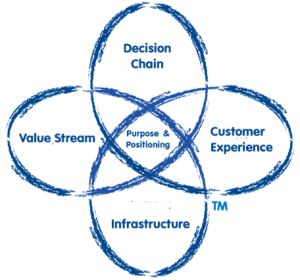While performance measurement remains an important topic, it is only a subset of the broader field of organisational performance management.
Strategic, operational and financial performance depends not only on improving how the work gets done in organisations but also on how organisations are managed.
Connecting individuals, teams, functions and levels of management, both within and with partners, to improve the quality and timeliness of decision-making and action is vital in this respect – yet currently poorly done in many organisations.
Landmark Consulting has developed a new approach to maximising customer delight and bottom-line performance which we call “Connected Performance”.
Connected Performance not only delivers superior strategic, operational and financial performance but also concurrently develops an engaging, effective, learning culture, which, in turn, delivers genuine organisational agility.
Developed and honed over 25 years, working with organisations of all kinds, this approach has proved hugely helpful for them.
Moreover, this experience has given us a privileged perspective on implementation. For instance, in working with 50% of the ambulance services in England and Wales – all of whom provide essentially the same services, typically use the same clinical protocols and chose to adopt the Connected Performance approach – has given us unique insights around the success factors critical to implemention and sustainability.
To read a paper outling the key elements of Connected Performance, please see PMA 2012 Paper (Final Version).
To read an earlier paper presented at the PMA Conference in Edinburgh in 2004, please see Paper for PMA 2004 (Final)

